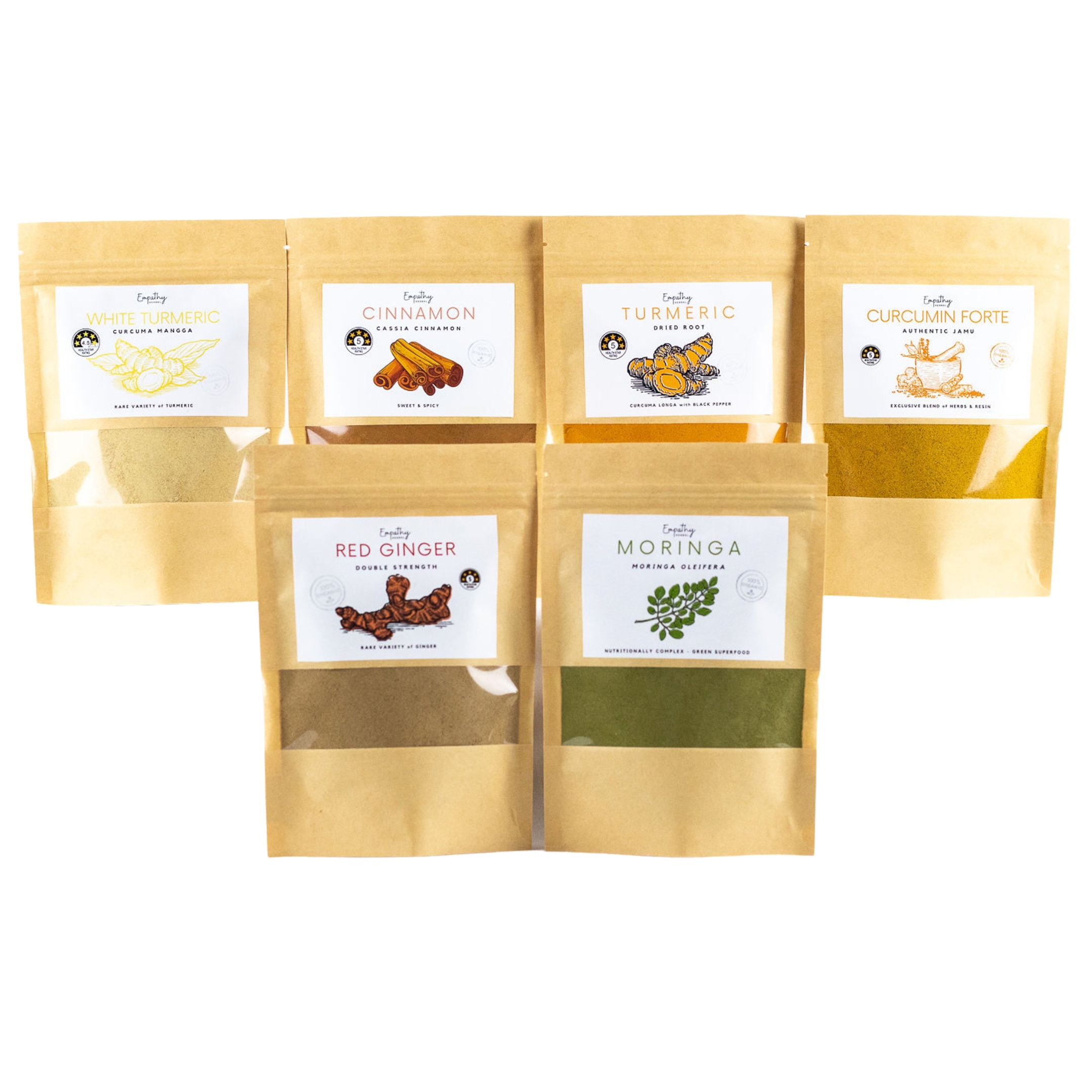Anti-Inflammatory Herbs
Nature’s Pharmacy: Selecting Anti-Inflammatory Herbs for Optimal Health
Embark on a journey to wellness with nature’s finest anti-inflammatory herbs.
These delicious plant medicines offer a gentle, effective path to soothing everyday inflammation and bolstering your immune system.
Anti-Inflammatory Herbs
What Causes Inflammation in the Body? Inflammation in the body is caused by the immune system’s response to harmful stimuli, such as pathogens, damaged cells, or irritants. It’s a protective mechanism intended to eliminate the initial cause of cell injury, clear out damaged cells and tissues, and establish a repair process.
Anti Inflammatory Diet
Incorporating anti-inflammatory herbs into your diet can greatly enhance your well-being. These powerful plants can fortify your body’s defences against inflammation and help prevent short-term flare-ups from settling into chronic issues.
- MORINGA: Natural Muli-Vitamin, adds extra nutrition to your diet
- CURCUMIN: All-In-One Anti-Inflammatory Blend, helpful for most varieties of inflammation.
- RED GINGER: Hot & Spicy, 10x stronger than fresh ginger root
- TURMERIC: with Black Pepper, activated for maximum health benefits
- WHITE TURMERIC: Naturally Bio-Available, no orange stains or black pepper needed
- CINNAMON: Hot, Sweet & Spicy, cassia variety of cinnamon
- BLACK GARLIC: Soft, Sweet & Aged, delicious flavour & no garlic breath
What triggers chronic inflammation chronic? Chronic inflammation can occur when this response lingers, leaving the body in a constant state of alert. Over time, chronic inflammation may contribute to various diseases, including some heart disease, cancers & rheumatoid arthritis.
Anti-Inflammatory Foods and Herbs
Natural Anti-inflammatory Foods and Herbs
All health experts, from doctors to scientists, recommend infusing your diet with natural anti-inflammatory foods and herbs. However, it can be challenging to know how to incorporate these powerful ingredients into your meals in a delicious and beneficial way.
Don’t worry—we’ve got you covered with simple, tasty suggestions to add these health-boosting herbs into your daily eating routine seamlessly.
- Red Ginger: Sprinkle red ginger powder into stir-fries, smoothies, or teas for a warm, spicy kick. It pairs well with sweet and savoury dishes alike.
- White Turmeric (Curcuma mangga): Its mild flavour is perfect for rice dishes, soups, and marinades. Use it as you would yellow turmeric, but expect a subtler, slightly fruitier note.
- Turmeric: Bright and earthy orange turmeric powder can be added to curries, soups, and sauces. It lends a vibrant colour, a burst of flavour, and numerous health benefits.
- Cinnamon: A versatile spice for both sweet and savoury dishes. Sprinkle cinnamon over cereal, porridge and into baking recipes, or rubs for meats.
- Moringa: The green, slightly grassy taste of moringa powder works well in green smoothies, salad dressings, or as a sprinkle on top of finished dishes.
- Curcumin: Can also be added to curries, roast veggies, rice dishes and golden milk or to made a paste for wellness shots.
- Black Garlic Cloves: Can be diced (on a wet chopping board, so they don’t stick together). Then incorporate them into sauces, spreads, or as a finishing garnish on almost any savoury dish for a sweet, umami-rich flavour.
These anti-inflammatory herbs can be paired with anti-inflammatory foods to create powerful dietary combinations.
Top 13 Anti-Inflammatory Foods to Eat Regularly
- Fatty Fish: Rich in omega-3 fatty acids, options like salmon, mackerel, and sardines can reduce inflammation.
- Leafy Greens: Vegetables like spinach and kale are high in antioxidants and vitamins.
- Berries: Strawberries, blueberries, and blackberries contain antioxidants called anthocyanins.
- Nuts: Almonds and walnuts are full of healthy fats and vitamin E.
- Olive Oil: Extra virgin olive oil is loaded with monounsaturated fats and oleocanthal, which has properties similar to NSAIDs.
- Tomatoes: Packed with lycopene, tomatoes can help reduce inflammation.
- Cherries: Both sweet and tart cherries are rich in antioxidants.
- Whole Grains: Foods like brown rice and oatmeal carry fibre and other anti-inflammatory substances.
- Capsicum Peppers: Bell peppers and chili peppers are full of vitamins and anti-inflammatory compounds.
- Dark Chocolate: Cocoa is rich in flavanols that can reduce inflammation.
- Green Tea: The polyphenols in green tea are known for their anti-inflammatory effects.
- Avocados: High in potassium, magnesium, fibre, and heart-healthy monounsaturated fats.
- Seeds: Chia seeds, flaxseeds, and hemp seeds contain omega-3 fatty acids and antioxidants.
What Herb is Best for Inflammation?
What Herbs Help with Inflammation in the Body?
When it comes to soothing inflammation, the natural world offers a wealth of herbs that can help. The best herbs to reduce inflammation are tailored to your specific health needs and symptoms. Understanding which herbs target different types of inflammation can empower you to make informed choices. Whether you’re dealing with joint pain, digestive issues, or overall immune system support, there’s a herb that can bring relief and help heal your body.
What Herb is a Natural Anti Inflammatory?
- Red Ginger: Contains gingerol, which is excellent for digestive inflammation and muscle pain due to its pain-relieving and soothing effects.
- Black Garlic: Rich in S-allyl cysteine, this slow-roasted garlic is beneficial for cardiovascular inflammation as it can help lower cholesterol levels and reduce arterial inflammation.
- White Turmeric (Curcuma manga): Offers a high level of caryophyllene, making it suitable for skin and gut health by reducing local inflammation.
- Turmeric: The curcumin found in this spice is effective for joint inflammation, commonly associated with arthritis due to its potent anti-inflammatory and antioxidant properties.
- Cinnamon: With its active component cinnamaldehyde, cinnamon can help with metabolic inflammation, thus being beneficial for those with blood sugar issues.
- Moringa: Contains isothiocyanates, known for their effectiveness in systemic inflammation, which can benefit overall immune health.
- Curcumin (All-in-One Anti-Inflammatory Herbal Blend): This concentrated form of turmeric’s active compound curcumin, when mixed with other anti-inflammatory herbs, can offer widespread inflammatory relief, especially for chronic conditions.
By incorporating these herbs into your diet, you can naturally target and relieve different types of chronic inflammation.
Anti Inflammatory Herbs and Supplements
Natural Anti Inflammatory Herbs
Natural anti-inflammatory herbs and supplements are powerful allies in maintaining your health and well-being. They work by calming the body’s inflammatory response, which can reduce pain and prevent chronic diseases. When these herbs are part of a lifestyle that also prioritises whole-body health, the benefits are significantly more impactful.
What does an anti-inflammatory lifestyle look like? It involves five key practices:
- A Nutritious Diet: Fill your plate with a variety of whole foods. Fresh fruits and vegetables, whole grains, lean proteins, and healthy fats are the building blocks. Enhance your meals with natural anti-inflammatory herbs, such as turmeric and ginger, and enjoy herbal teas that soothe the body.
- Regular Physical Activity: Stay active with activities you love. Whether swimming, biking, or playing a team sport, moving your body helps reduce inflammation and boosts your mood.
- Flexibility: Incorporate stretching or practices like yin yoga into your daily routine. These activities improve muscle and joint flexibility, preventing injury and keeping your body agile.
- Breathwork: Take a few minutes each day to focus on your breathing. Techniques like deep breathing can quickly reduce stress levels, which is crucial since stress is a known contributor to inflammation.
- Mindfulness: Meditation and positive affirmations can cultivate a mindset that’s more resilient to stress, compassionate, and empathetic.
By integrating these practices into your life, alongside the use of anti-inflammatory herbs and supplements, you create a comprehensive approach to enhancing overall health. This lifestyle is about more than just managing inflammation; it’s about creating a foundation for a happier and healthier life.
Anti Inflammatory Herb Tea
How Does Tea Reduce Inflammation?
Creating your anti-inflammatory tea is a delightful way to support your health. You can blend powdered herbs with other store-bought teas, such as chamomile, or add them to your favourite milk (dairy or plant-based)to keep your tea exciting and enjoyable.
Different methods for preparing anti-inflammatory tea using powder
- Hot Water Brew: Add your chosen amount of powder to a pot with 1–2 cups of water. Boil for 10 minutes. Afterwards, strain the mixture through a sieve or cheesecloth to remove the powder residue.
- Cold Infusion: Mix 2-3 teaspoons of the powder in a sealed jug with 1–1.5 litres of cold water. Refrigerate for 24 hours, shake it occasionally, and then sip cold brew tea throughout your day.
- Quick Fix: Stir a serving of the powder into a mug of boiling water. Cover and let it steep for 5-10 minutes, then enjoy it, sediment included.
- Homemade Tea Bag: Place a serving of your powdered herb into an empty tea bag and steep it in boiling water, just like a regular tea bag.
- Paste Method: Make a paste with a serving of the herb powder, a little water, and a drop of a healthy oil like coconut or olive. Mix well, add hot water and stir until the mixture is even.
*Remember, if you’re not consuming the powder directly, you may need to use more to get the full benefits, especially if you’re not supplementing your diet with other anti-inflammatory foods or supplements. The general guideline is around 1 teaspoon (3 grams) of herbs daily.
Making an anti-inflammatory herb tea instead of taking supplements offers several benefits:
- Hydration: Drinking tea helps keep you hydrated, essential for overall health and can help the body manage inflammation naturally.
- Gentle Absorption: The compounds (when brewing in /extracted by hot water) are absorbed more gently and steadily. This approach is easier on the digestive system than high-dose supplements once or twice a day.
- Ritual & Relaxation: Preparing and sipping tea can be calming and meditative, contributing to stress reduction, which can lower inflammation.
- Low, Slow & Long: Anti-inflammatory herb tea can be drunk throughout the day, offering a long, slow and low intake of phytochemicals to reduce inflammation.
- Taste & Enjoyment: Herbal teas can be delicious and comforting, making the act of consuming anti-inflammatory herbs more enjoyable.
- Culinary Versatility: Teas can be enjoyed hot or cold and incorporated into various recipes, making them a versatile way to include anti-inflammatory herbs in your diet.
Anti Inflammatory Supplements Australia
Best Natural Anti Inflammatory Herbs
Empathy Herbal provides some of the finest anti-inflammatory supplements Australia has to offer. Our products are crafted from 100% pure, premium herbs without preservatives or additives. Adhering to the strictest food safety standards, we’ve combined a selection of the best natural anti-inflammatory herbs for your convince. Our commitment is to offer you excellent health options at competitive prices, making your well-being our priority.
As dedicated manufacturers—not resellers—of the best natural anti-inflammatory herbs, we stand by the quality and integrity of our products. Choosing Empathy Herbal means you’re opting for a trustworthy and authentic source for your natural anti-inflammatory needs.
Buy Anti-Inflammatory Herbs
Buy the Best Natural Anti Inflammatory Herbs
When you buy anti-inflammatory herbs, you invest in your body’s natural ability to combat inflammation. A well-rounded diet enhanced with these herbs supports a robust immune response, helping to keep inflammation in check and prevent it from progressing into chronic issues. Embrace the power of nature’s finest herbs to maintain your health and vitality.



Very high quality. So much fresher than store bought.